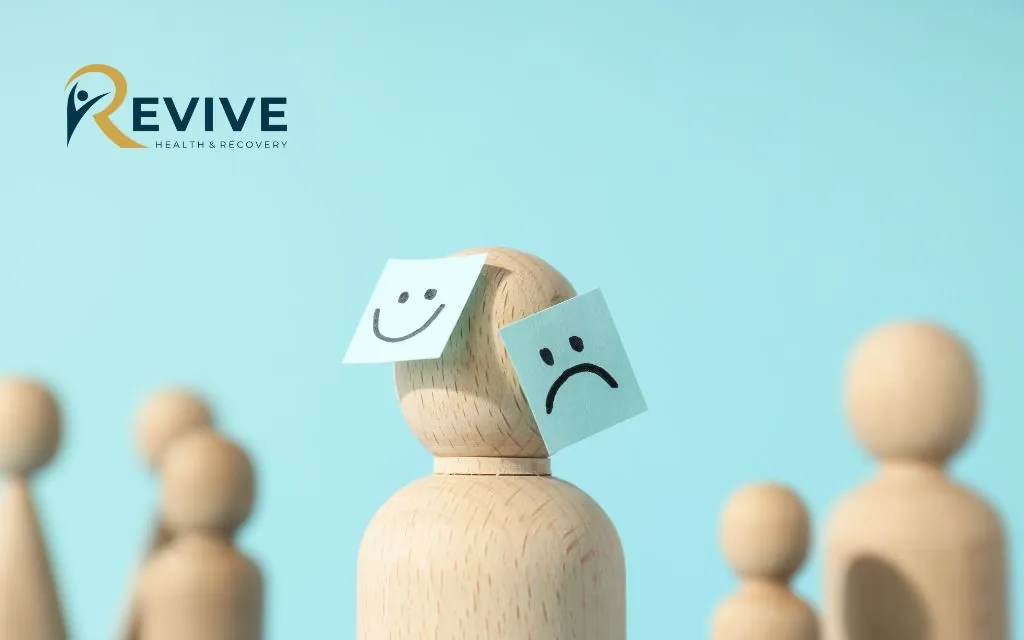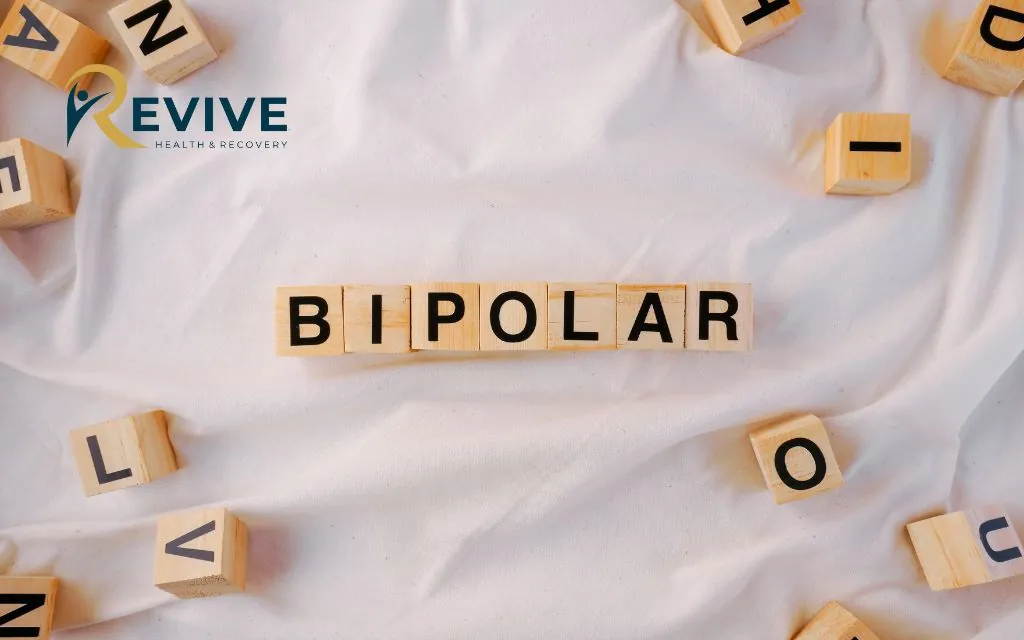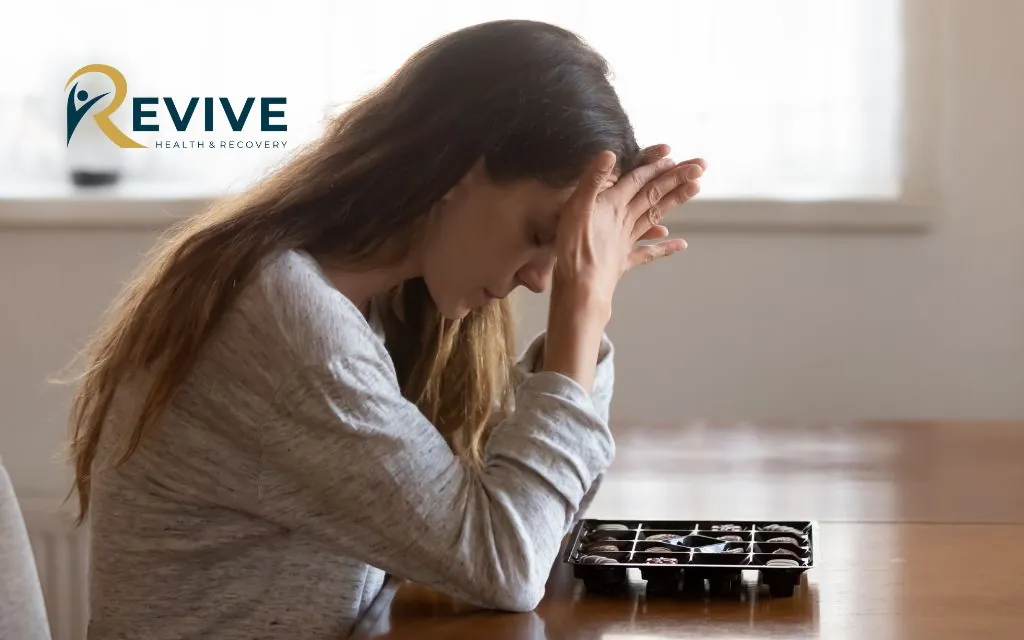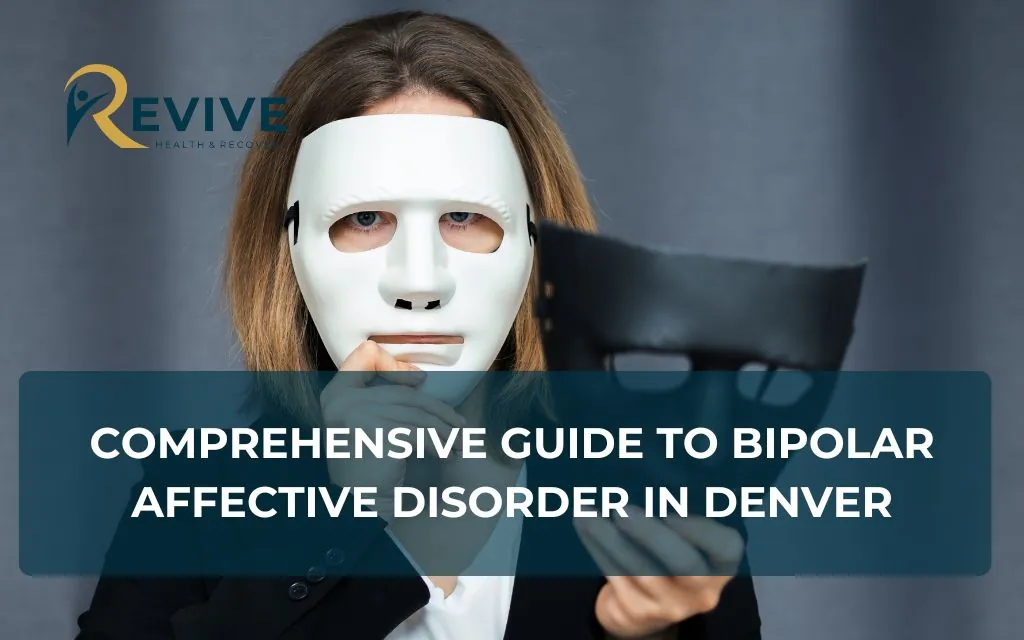Bipolar affective disorder is a complex mental health condition that affects approximately 2.8% of adults in the United States. If you or someone you love is navigating the challenges of this condition in Denver, Colorado, understanding your treatment options is the first step toward stability and recovery. At Revive Health Recovery, we provide comprehensive, evidence-based care for individuals with bipolar disorder, combining innovative mental health treatments with compassionate support tailored to your unique needs.
Understanding Bipolar Affective Disorder
What is Bipolar Disorder? Symptoms and Types
Bipolar affective disorder is a mental health condition characterized by extreme mood swings that include emotional highs (mania or hypomania) and lows (depression). Previously known as manic depression, this condition affects about 2.8% of the U.S. adult population, with nearly 83% of cases classified as severe if left untreated. The average age of onset is around 25, although symptoms can appear during the teenage years or, less commonly, in childhood. NAMI
Bipolar disorder is categorized into several types:
- Bipolar I Disorder: Characterized by manic episodes lasting at least seven days or by manic symptoms so severe they require immediate hospital care. Depressive episodes typically last at least two weeks.
- Bipolar II Disorder: Defined by a pattern of depressive episodes and hypomanic episodes (less severe than full mania).
- Cyclothymia: A milder form of bipolar disorder featuring periods of hypomanic symptoms and depressive symptoms lasting for at least two years.
- Other Specified Bipolar Disorders: Conditions that don’t match the three categories above but still feature significant mood elevation and depression.
Unlike major depression, bipolar disorder involves periods of abnormally elevated mood that significantly impact daily functioning. This distinction is crucial for proper diagnosis and treatment planning at our Denver facility.

Signs and Symptoms to Recognize
Recognizing the symptoms of bipolar affective disorder is essential for early intervention and effective treatment. The condition manifests differently during manic and depressive episodes.
Manic episode symptoms include:
- Feeling unusually “high,” euphoric, or irritable
- Increased energy, activity, and restlessness
- Racing thoughts and rapid speech
- Decreased need for sleep
- Unrealistic beliefs in one’s abilities or powers
- Poor judgment and impulsivity
- Engaging in risky behaviors (excessive spending, reckless driving, substance use)
Depressive episode manifestations include:
- Persistent sad, anxious, or empty mood
- Loss of interest in previously enjoyed activities
- Decreased energy and fatigue
- Difficulty concentrating or making decisions
- Changes in sleep patterns (insomnia or oversleeping)
- Changes in appetite and weight
- Thoughts of death or suicide
Some individuals experience “mixed features,” where symptoms of both mania and depression occur simultaneously. This complex presentation can be particularly challenging to treat and requires specialized care from bipolar disorder specialists in Colorado.
Rapid cycling bipolar disorder, characterized by four or more mood episodes within a 12-month period, affects approximately 10-20% of people with the condition and often requires more intensive treatment approaches.
The Impact of Bipolar Disorder on Daily Life
Bipolar affective disorder significantly impacts all aspects of daily life, affecting relationships, work performance, and overall well-being. During manic phases, individuals may make impulsive decisions that damage relationships or create financial hardship. During depressive phases, withdrawal from social activities and difficulty maintaining work responsibilities are common.
In Colorado, the challenges of bipolar disorder may be compounded by environmental factors. Research suggests that the high altitude and significant seasonal changes in Colorado can influence mood stability in some individuals with bipolar disorder. Additionally, the active lifestyle promoted in Denver and surrounding areas can sometimes mask symptoms or complicate medication management.
Statistical data indicates that the prevalence of bipolar disorder in Colorado is comparable to national averages, affecting approximately 2.8% of adults. However, access to specialized care varies significantly across the state, with more resources concentrated in urban areas like Denver.
At Revive Health Recovery, we understand these unique challenges and offer comprehensive treatment that addresses both the medical aspects of bipolar disorder and the specific lifestyle considerations relevant to our Denver community.

Treatment Options for Bipolar Disorder in Denver
Medical Management with Denver Specialists
Finding qualified psychiatrists who specialize in bipolar disorder treatment is a crucial first step in managing this condition. Denver offers several options for specialized psychiatric care, including Revive Health Recovery’s team of experienced mental health professionals dedicated to bipolar disorder treatment.
Medication management is the cornerstone of bipolar disorder treatment. Common medications prescribed in Colorado include:
- Mood stabilizers: Such as lithium, valproic acid, and lamotrigine
- Atypical antipsychotics: Including quetiapine, olanzapine, and aripiprazole
- Antidepressants: Used cautiously and typically in combination with mood stabilizers
- Anti-anxiety medications: Sometimes prescribed for short-term symptom management
Consistent medication management with regular follow-up appointments is essential for successful treatment. At Revive Health Recovery, our psychiatrists create personalized medication plans and provide ongoing monitoring to minimize side effects while maximizing therapeutic benefits.
For Colorado residents, insurance considerations are an important aspect of treatment planning. Most insurance plans, including Colorado Medicaid, cover bipolar disorder treatment, though coverage details vary. Our team at Revive Health Recovery works with patients to navigate insurance questions and maximize available benefits. For specific cost information and insurance questions, contact our team at (303) 268-4655.
Psychotherapy Approaches for Bipolar Management
While medication provides the biological foundation for stability, psychotherapy offers essential skills for managing bipolar disorder and improving quality of life. Denver offers a range of evidence-based therapy options.
Cognitive Behavioral Therapy (CBT) helps individuals identify and change negative thought patterns and behaviors that contribute to mood episodes. CBT has shown particular efficacy for preventing relapse in bipolar disorder by teaching patients to recognize early warning signs of mood shifts. Denver’s mental health community has embraced CBT as a primary treatment approach, with many specialized providers available.
Dialectical Behavior Therapy (DBT) combines cognitive techniques with mindfulness practices to improve emotional regulation—a key challenge in bipolar disorder. DBT resources in Denver include specialized group programs and individual therapy options.
Family-focused therapy recognizes the impact of bipolar disorder on the entire family system. This approach improves communication, reduces conflict, and helps family members support their loved one’s recovery. The University of Colorado’s STEADY Program utilizes family-focused interventions as part of their comprehensive treatment model.
At Revive Health Recovery, we integrate these therapeutic approaches into individualized treatment plans, combining evidence-based interventions with a supportive therapeutic relationship to help our clients manage their bipolar disorder effectively.
Innovative Treatments Available in Colorado
Colorado stands at the forefront of innovative treatment approaches for bipolar disorder, offering several cutting-edge options for individuals who haven’t responded adequately to traditional treatments.
Ketamine infusion therapy is being offered in Boulder and Denver as a promising option for treatment-resistant bipolar depression. This rapid-acting treatment can provide relief when other approaches have failed. Centers like Boulder Mind Care and Bodhi Infusion Center specialize in ketamine treatments, with some reporting significant improvement in depressive symptoms within hours or days rather than the weeks typically required for traditional antidepressants to take effect.
Colorado’s natural environment has inspired the development of nature-based therapeutic approaches for bipolar disorder. These programs integrate traditional therapy with outdoor activities, leveraging Colorado’s mountains, parks, and open spaces as healing environments. Research suggests that structured nature exposure can help regulate mood and reduce symptoms in some individuals with bipolar disorder.
Digital mental health tools supported by Colorado providers include mood tracking apps, telehealth services, and online therapy platforms. These technologies extend access to care beyond traditional office visits, allowing for more continuous monitoring and support.
The Colorado Bipolar Education Project (CoBE) promotes evidence-based, innovative approaches to bipolar disorder management through educational resources for patients, families, and providers, enhancing the overall quality of care available in the region.

Support Systems for Bipolar Disorder in Denver
Community Resources and Support Groups
Beyond clinical treatment, community support plays a vital role in managing bipolar disorder. Denver offers robust resources for individuals seeking peer connection and ongoing support.
The Depression and Bipolar Support Alliance (DBSA) Denver hosts regular support group meetings exclusively for individuals with bipolar disorder and depression. These peer-led groups provide a safe space for sharing experiences and coping strategies. DBSA Denver welcomes adults (18+) dealing with bipolar or depression issues, offering camaraderie and understanding that complements professional treatment. DBSA Denver
NAMI Colorado (National Alliance on Mental Illness) provides education, advocacy, and support group programs specific to bipolar disorder. Their Family-to-Family program helps loved ones understand bipolar disorder and develop skills to support recovery while maintaining their own well-being.
Denver also features several peer support initiatives where individuals with lived experience of bipolar disorder provide guidance and encouragement to others on their recovery journey. These programs foster hope and demonstrate that stable, fulfilling lives are possible despite a bipolar diagnosis.
Online communities with Colorado connections offer flexible support options, particularly valuable for those in rural areas or with limited mobility. These virtual groups maintain the local focus that makes resource sharing relevant and applicable.
Crisis Intervention Services in Colorado
Despite the best treatment plans, individuals with bipolar disorder may sometimes experience crisis situations requiring immediate intervention. Colorado has developed comprehensive resources to address these needs.
Colorado Crisis Services operates a 24/7 hotline (1-844-493-8255) and walk-in centers throughout the state, providing immediate support during mental health emergencies. Their mobile crisis response teams can provide in-person assessment and intervention when needed.
Denver’s major hospitals offer emergency psychiatric services for situations requiring immediate medical attention. Facilities like Denver Health, University of Colorado Hospital, and Porter Adventist Hospital provide specialized care for psychiatric emergencies, including those related to bipolar disorder.
Understanding what to expect during a mental health crisis in Colorado helps individuals and families navigate these challenging situations more effectively. Typically, crisis intervention involves assessment, stabilization, and connection to ongoing care. In some cases, short-term hospitalization may be recommended to ensure safety and adjust treatment.
Colorado also emphasizes post-crisis follow-up services, ensuring individuals don’t fall through the cracks after emergency intervention. These services facilitate smooth transitions back to routine care and reduce the risk of future crises.
Family Support and Education in Denver
Bipolar disorder affects not only the individual with the diagnosis but their entire support network. Denver provides several resources specifically for family members and caregivers.
The Colorado Bipolar Education Project (CoBE) offers educational programs that enhance understanding of bipolar disorder and its treatment. Their resources help families learn about the condition, treatment options, and strategies for supporting their loved ones while maintaining healthy boundaries. CoBE’s videos and materials address common questions and concerns, empowering families with knowledge.
Denver offers various family therapy options that address the specific challenges faced by families affected by bipolar disorder. These therapeutic approaches improve communication, reduce conflict, and help family members work together to support recovery.
Legal and advocacy resources in Colorado provide guidance on issues like guardianship, disability benefits, and workplace accommodations. Organizations like Disability Law Colorado help families navigate these complex systems and ensure their loved ones receive appropriate support and protection.
At Revive Health Recovery, we recognize the crucial role families play in successful treatment outcomes and provide education and support for the entire family system.
Living Well with Bipolar Disorder in Colorado
Lifestyle Management Strategies
Effective management of bipolar disorder extends beyond medication and therapy to include lifestyle factors that significantly impact mood stability. Colorado’s unique environment presents both challenges and opportunities in this regard.
Colorado’s high altitude and climate may affect bipolar symptoms in some individuals. Research suggests that the reduced oxygen at higher elevations can influence brain chemistry, potentially impacting mood stability. Additionally, Colorado’s abundant sunshine may disrupt sleep patterns, particularly during summer months with extended daylight hours. Awareness of these environmental factors allows for proactive management strategies.
Nutrition and exercise recommendations for mood stability include:
- Regular, balanced meals to maintain steady blood sugar levels
- Omega-3 fatty acids, found in fish and flaxseeds, which may help stabilize mood
- Regular physical activity, which Denver’s outdoor recreational opportunities readily support
- Limiting caffeine, alcohol, and processed foods, which can trigger mood fluctuations
Sleep hygiene is particularly important for bipolar disorder management. Consistent sleep and wake times, creating a restful bedroom environment, and limiting screen time before bed can help maintain the regular sleep patterns essential for mood stability.
Denver’s active lifestyle and strong emphasis on wellness provide a supportive environment for implementing these strategies, though the city’s social scene can sometimes present challenges for those needing to limit alcohol consumption or maintain regular sleep schedules.
Building a Comprehensive Treatment Plan
Working collaboratively with Denver healthcare providers to create an integrated treatment plan significantly improves outcomes for bipolar disorder. This plan should combine medication management, therapy, and lifestyle approaches tailored to individual needs and preferences.
Effective treatment plans include strategies for monitoring and managing symptoms, such as mood tracking, identifying personal triggers, and developing early intervention strategies for mood episodes. Many Denver providers now incorporate digital tools to facilitate this monitoring between appointments.
Creating a wellness toolbox with locally available resources provides ready access to support when needed. This might include contact information for healthcare providers, crisis services, support groups, and trusted friends or family members who understand the condition.
At Revive Health Recovery, we work with each client to develop a personalized treatment plan that addresses all aspects of bipolar disorder management and leverages Denver’s rich healthcare ecosystem.

Navigating Work and Relationships
Balancing bipolar disorder with work and social responsibilities requires strategic planning and appropriate accommodations. Colorado law provides important protections in this regard.
Workplace accommodations under Colorado law and the Americans with Disabilities Act (ADA) may include flexible scheduling, breaks for medication management or stress reduction, modified lighting, noise reduction measures, or remote work options. These reasonable accommodations enable many individuals with bipolar disorder to maintain successful careers while managing their condition.
Disclosure considerations in professional settings involve careful decision-making about whether, when, and how to share information about a bipolar diagnosis. While disclosure provides access to legal protections and accommodations, it may also expose individuals to stigma. Denver’s increasingly mental health-aware professional community has reduced this stigma in many workplaces, but considerations vary by industry and company culture.
Building supportive relationships in the Denver community provides essential social connection while respecting the boundaries needed for successful bipolar management. Denver’s diverse social scene offers many options for socializing that don’t center around activities that might trigger symptoms.
Colorado offers specialized resources for education and employment, including vocational rehabilitation services through the Division of Vocational Rehabilitation and educational accommodations through disability services offices at colleges and universities.
FAQs About Bipolar Disorder in Colorado
What are the best bipolar disorder treatment centers in the Denver area?
Revive Health Recovery stands out as a premier treatment center for bipolar disorder in Denver, offering comprehensive services including medication management, evidence-based therapy, and ongoing support. Our specialized team understands the unique challenges of bipolar disorder and tailors treatment to individual needs.
How do I find a psychiatrist in Colorado who specializes in bipolar disorder?
The most effective approach is to seek referrals from trusted healthcare providers or contact specialized mental health centers like Revive Health Recovery. Our intake team can match you with experienced psychiatrists who focus specifically on bipolar disorder treatment.
Does Colorado Medicaid cover bipolar disorder treatment and medications?
Yes, Colorado Medicaid covers mental health services, including treatment for bipolar disorder. Coverage typically includes psychiatric evaluations, medication management, therapy, and crisis services. For specific information about coverage and potential out-of-pocket costs, contact Revive Health Recovery at (303) 268-4655.
What support groups in Denver are specifically for people with bipolar disorder?
DBSA Denver offers peer-led support groups specifically for individuals with bipolar disorder. Additionally, Revive Health Recovery provides group therapy options as part of our comprehensive treatment approach, offering both professional guidance and peer support.
How can the high altitude and climate in Colorado affect bipolar disorder symptoms?
Colorado’s high altitude may impact brain chemistry and medication effectiveness for some individuals with bipolar disorder. Additionally, the state’s significant seasonal changes in daylight hours can affect circadian rhythms and sleep patterns. At Revive Health Recovery, we incorporate these environmental considerations into treatment planning to optimize stability.
5 Reasons to Choose Revive Health Recovery for Bipolar Disorder Treatment
- Specialized Expertise: Revive Health Recovery offers dedicated specialists in bipolar disorder treatment with a comprehensive understanding of the unique challenges faced by patients in Denver. Our team stays current with the latest research and treatment approaches to provide optimal care.
- Holistic Treatment Approach: We combine evidence-based medical management with innovative therapeutic interventions tailored to each individual’s needs. Our treatment plans address all aspects of well-being—physical, emotional, social, and spiritual – for truly comprehensive care.
- Convenient Denver Location: Centrally located at 1427 S Federal Blvd, our facility provides quality treatment accessible to residents throughout the Denver metro area. Our comfortable, welcoming environment fosters healing and recovery.
- 24/7 Support Availability: We offer round-the-clock assistance at (303) 268-4655, ensuring help is always available during critical moments. This continuous support provides peace of mind for clients and their families.
- Integrated Aftercare Planning: Revive Health Recovery provides comprehensive follow-up care that supports long-term stability and prevents relapse through ongoing community connections and resources. We stay connected with our clients throughout their recovery journey.
Take the First Step Toward Recovery with Revive Health Recovery
Living with bipolar affective disorder presents unique challenges, but with proper treatment and support, individuals can achieve stability and lead fulfilling lives. Seeking professional help is the most important step you can take toward recovery.
At Revive Health Recovery in Dember, we’re committed to providing compassionate, effective treatment for bipolar disorder. Our comprehensive approach addresses all aspects of this complex condition, from medication management to therapy, lifestyle strategies, and family support.
We invite you to take the first step toward a more stable, balanced life by reaching out to our team today. Our dedicated staff is available 24/7 to answer your questions, address your concerns, and begin the intake process.
Contact Revive Health Recovery:
- Address: 1427 S Federal Blvd, Denver, CO 80219
- Email: contact@revivehealthrecovery.com
- Phone: (303) 268-4655 (Available 24/7)
Don’t wait to get the help you deserve. Recovery from bipolar disorder is possible with the right support and treatment approach. Let Revive Health Recovery be your partner on the journey to wellness and stability.



